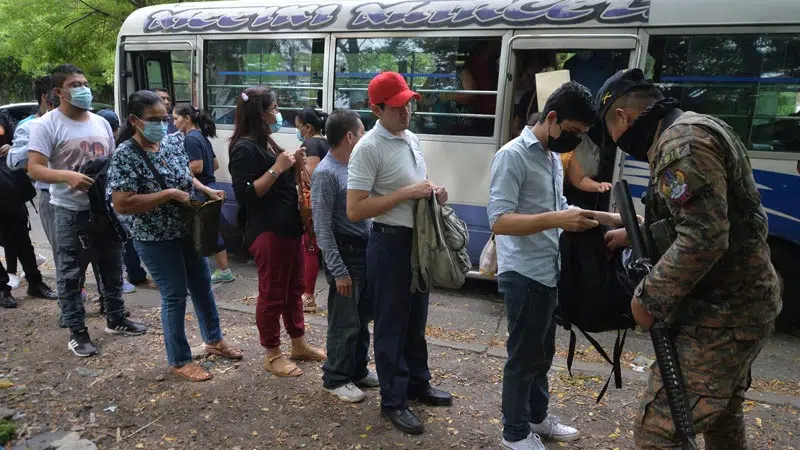Salvadorans are cautious when expressing their opinions about the country’s political situation, according to a survey by the Public Opinion Institute (Iudop) of the Central American University José Simeón Cañas (UCA).
Even though the Salvadoran population endorses the government’s management, mostly describing it as a “good president,” “good job,” “good,” and “dictator” for Nayib Bukele as president and his party as “good party,” “security,” and “the president’s party,” the population for the second time indicated in the survey that they are cautious before voicing their political considerations.
While in the January survey, 62.7% of respondents said they were being more cautious about the political opinions they make public, 1.5% abstained from acknowledging it, and 35.8% considered it not; the percentage for this latest survey, although the positive response decreases, is still well above half.
Now, 54.4% of respondents said they are more careful with their opinions on the subject, 44.1% considered they are not, and 1.4% preferred not to answer. For the director of Iudop, Laura Andrade, this is linked to the official discourse.
She points out that the official discourse tells the Salvadoran population that thinking differently or having a different alternative from the ones advertised by the authorities, through their media channels, represents an opposition group; and therefore, they become enemies of the ruling party.
“Considering that, the criticisms that the population can authentically make to the authorities are reflected in that high percentage of people where they prefer to omit it to avoid getting into trouble,”
— Laura Andrade, director of Iudop
For his part, the vice-rector of Social Projection at UCA, Omar Serrano, considered that the caution with which some citizens may express themselves about the country’s situation is based on fear, often caused by the state of exception in effect for more than two years.
“There is fear, one can perceive it in the streets, and that prevents people from expressing their opinions about the current situation; it is evident that fear permeates the atmosphere in the country,” said the expert.
“This is one of the most harmful elements of the way we are being forced to take a position of being totally in favor or totally against the authorities, without seeing the whole intermediate gray scale that is there to evaluate each of the decisions that have been made at least in this first five-year term,” Andrade concluded.
Salvadoreños se expresan con temor de la política local: Iudop
Los salvadoreños se muestran cautelosos al expresar sus opiniones sobre la coyuntura política del país, según lo revela una encuesta del Instituto Universitario de Opinión Pública (Iudop) de la Universidad Centroamericana José Simeón Cañas (UCA).
Aún cuando la población salvadoreña avala la gestión gubernamental calificándola en su mayoría como “buen presidente”, “buen trabajo”, “bien”, “bueno” y “dictador” a Nayib Bukele como presidente y a su partido como “buen partido”, “seguridad” y “el partido del presidente”, la población por segunda vez manifestó en la encuesta sí tener cuidado antes de emitir sus consideraciones políticas.
Si bien en la encuesta de enero un 62.7 % de los encuestados afirmó estar teniendo más cautela ante las opiniones políticas que hace públicas, un 1.5 % se abstuvo de reconocerlo y un 35.8 % consideró que no; el porcentaje para esta última encuesta si bien desciende la respuesta positiva, sigue siendo muy por encima de la mitad.
Ahora, el 54.4 % de los encuestados manifestó sí ser más cuidadoso con lo que opina sobre el tema, un 44.1 % consideró que no y el 1.4 % prefirió no responder. Para la directora del Iudop, Laura Andrade, esto está ligado con el discurso oficial.
Pues señala que el discurso oficial le dice a la población salvadoreña que pensar diferente o tener una alternativa distinta de las que las autoridades publicitan, a través de sus medios de comunicación, representa un grupo de oposición; y por lo tanto, se constituyen en enemigos del oficialismo.
“Teniendo en cuenta eso, las críticas que la población auténticamente pueda hacer a las autoridades se refleja en ese alto porcentaje de la gente en donde prefieren omitirlo para no meterse en problemas”,
— Laura Andrade, directora del Iudop
Por su parte, el vicerrector de Proyección Social de la UCA, Omar Serrano, consideró que la cautela con la que se pudiesen expresar algunos ciudadanos sobre la situación del país está basada en el miedo, muchas veces causado por el régimen de excepción vigente desde hace más de dos años.
“Hay miedo, uno lo puede percibir en la calle y eso evita que la gente exprese sus opiniones con respecto a la situación actual, es evidente que el miedo permea en el ambiente en el país”, señaló el experto.
“Este es uno de los elementos más perniciosos de la forma en la que nos están obligando a tomar una posición de estar a favor totalmente o en contra totalmente de las autoridades, sin ver toda la escala de grises intermedia que está para evaluar cada una de las decisiones que se han tomado al menos en este primer quinquenio”, concluyó Andrade.

